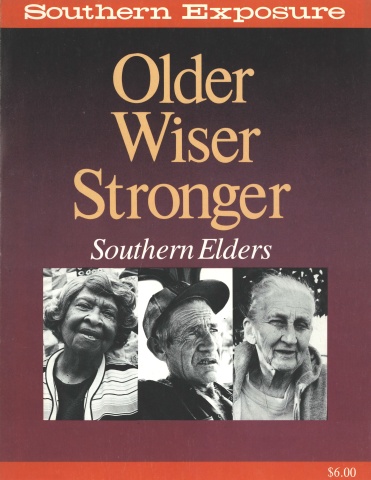"Doing the right thing"

This article originally appeared in Southern Exposure Vol. 13 No. 2/3, "Older Wiser Stronger: Southern Elders." Find more from that issue here.
"You've got to face it," her doctor said, "she really can't handle her own medications. Besides, she'll soon be too weak to tend to her own needs. She'll get the 'round-the-clock care she needs in a nursing home." Her priest agreed. "Since she refuses to move to Florida with you, I'd get her on the waiting list at Rest Haven. You'll be doing the right thing."
So we took our mother to the nursing home for a familiarizing visit, hoping to allay the fear that froze in her eyes at the very words "nursing home." "That wasn't so bad," she conceded after the visit. But from that day until the night she died there, my own nostrils never got used to the assault of the dry, overheated atmosphere where the odors of disinfectant and stale urine battled for supremacy. Nor was I ever comfortable in the common room, where wary old eyes defied my recognition of the glittering walkers, wheelchairs, and canes for what they were — armaments in a losing struggle against helplessness. And if I felt bad, how much worse were my mother's fears?
How did she feel, a woman whose lifetime of total dependency on a devoted, but dominating, husband had left her helpless? Safe in his shadow, my mother had never paid a bill, balanced a checkbook, or put gas in a car. Yet, from a core of courage resurrected largely to spare her daughters the shame of "putting Mama away," she made the choice to enter the home.
During her settling-in period, Mama was quick to praise "those precious nurses," "the delicious meals," and "that whirlpool bath," but she said little about her fellow residents. "I don't know any of those old folks," was her muttered excuse for leaving them alone. The world, however, wouldn't leave her alone. The lonely demanded attention, the sick cried out in the night, and the querulous complained at all hours.
Finally Mama's pent-up frustration and grief burst through her passive acceptance. "Rest home," she yelled. "Who can rest here? These nurses are too durn lenient. Put me in charge of these old women. I'd take a broom handle and knock the stew out of 'em."
Released by her outburst, Mama was able to venture beyond her room, to see beyond herself. She began to recognize faded but familiar faces from her youth. "See that shaky old fellow leaning on that nurse? I remember when he could dance the Charleston all night long."
Surrounded by the frail and lame, Mama seemed to grow stronger. Her wobbly gait made no impression on people in wheelchairs. Her speech impediment didn't matter to the hard of hearing. And her fleeting confusions went unnoticed in a place where memories faded in and out like radio beams from far away and a sign read, "TODAY IS WEDNESDAY. THE NEXT MEAL IS LUNCH."
As Mama gained self-confidence, her feebler companions turned to her as a friend who could help with buttons and zippers, a friend who would cut the meat at dinner, and on at least one occasion a friend to trust with a dream. It happened on the night before the Valentine Ball, Rest Haven's social event of the year, complete with decorations and a live band. Mama was awakened by a persistent tapping at her door. A tiny, stooped figure shuffled in. "What on earth do you want, Mrs. McMorries? It's two o'clock in the morning." The small woman looked up with a shy smile. "I want you to teach me to dance," she whispered.
From dancing in the dark, Mama moved onto a brighter stage; in the last two years of her life — for the first time in her life — she became a leader. Frail Mama with bad feet, who had previously needed help to get from the porch to the car, recruited an open-air walking group from among the rocking chair set. Reticent Mama, with a speech impediment, led the handclapping gospel hymns at the daily chapel service. "Thank you, Lord, for making me whole; Thank you, Lord, for saving my soul." And submissive Mama found the pluck to persuade the director to let her set up a bird feeder, which encouraged the discouraged to share the joys of bird watching. Some even took to sneaking breakfast biscuits for crumbling around the feeder.
So, at the end of her life, in a nursing home in Mississippi where "home" became more than just a euphemism, Mama came into her own. Like the shower of sparks as the last log fells onto the grate, Mama's life blazed up in a final statement that was — at last — of her own making.
Tags
Evelyn May
Evelyn May, 59, lives and writes in Gulf Breeze, Florida, and is a part-time student at the University of West Florida, Pensacola. (1985)